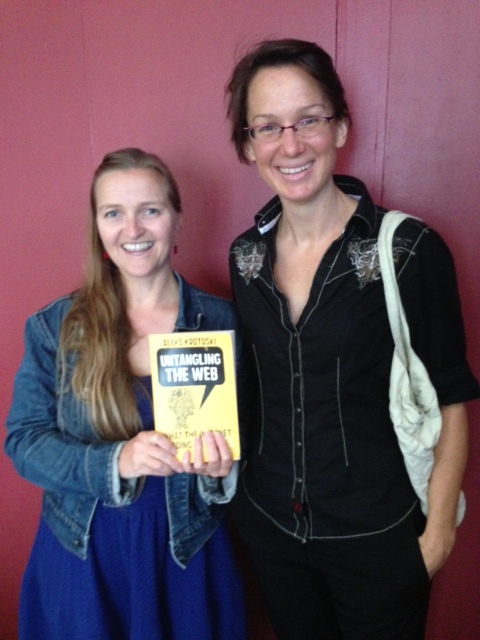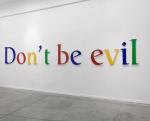
Salon London’s Helen Bagnall (left) uses her copy of Aleks Krotoski’s Untangling the Web to reflect laser beams sent from the future.

Salon London’s Helen Bagnall (left) uses her copy of Aleks Krotoski’s Untangling the Web to reflect laser beams sent from the future.
Quo Vadis for breakfast with Dylan Jones and his hugely entertaining romp (did people romp in the 1980’s, maybe the 1880’s?) through the running order of Live Aid on July 13 1985.
THE EIGHTIES – ONE DAY ONE DECADE uses the artists and players on the Wembley stage that day as a human prism through which to view the moment the me generation became, temporarily at least, the we generation. To get us in the mood,, I played the introduction to LIVE AID on the big screen, (courtesy of YOUTUBE), Richard Skinner’s voice bursting out of the surround sound speakers “It’s twelve noon in London, 7am in Philadelphia…”
And, as if that wasn’t enough sensory nutrition, we had a protagonist from the the big day joining us at the table – Ivor Novello winning singer/songwriter/film star/ former Spandau Balleteer and LIVE AID veteran, Gary Kemp – Sitting opposite Dylan, Gary shared secrets, gossip and a very honest perspective of the world through the eyes of a pop star.
Age ranges in the room spanned six decades of experience and musical sensibility – fascinating for instance, to hear Novel Diner’s Mina Holland give her view of the eighties, the decade in which she came into the world, and heartening to realise that we could all sit round a table one sunny morning in Soho, sharing a book, some breakfast and each other’s company before bouncing back into the distractions of day to day life.
table one sunny morning in Soho, sharing a book, some breakfast and each other’s company before bouncing back into the distractions of day to day life.
Over to The Ritz this morning for Harrington Starr’s networking breakfast, hosted by the book-loving, thought-leading Toby Babb (pictured on the left) with Khoi Tu, author of the excellent SUPERTEAMS – The Secrets of Stellar Performance from Seven Legendary Teams.
After posh pastries served up by white gloved waiters, we sat down for a masterclass on what it takes to lead (and be part of) the best teams in the world; from Ferrari to the SAS to the Rolling Stones, Red Cross, Pixar and everyone’s favourite despot, the late great Steve Jobs, who fell out with everyone before falling in love with Jony Ive.
Three things have stuck in my mind regarding Khoi’s experience in the Super League:
1. To succeed you need to be competent, reliable and trustworthy, a bit of empathy doesn’t harm anyone either. If you are the opposite to any of these things, people tend not to want to work with / for you. Obvious right? Try telling the “top entrepreneurs” on the Apprentice. Or me ten years ago.
2. You don’t have to like each other as friends to be a Superteam, you just have to have a common goal and respect for each other’s ability (see above). As Nelson Mandela said of FW de Klerk, the man who helped him conquer apartheid, “I don’t want to hang out with him.”
3. Being a great winner (EG Tiger Woods) is not the same as being a great leader (EG Colin Montgomerie). Apparently Woods Senior used to make little Tiger hit golf balls at his Dad’s face while he shouted abuse at him, to make him focus. I don’t know what Colin’s Dad did to encourage his son to focus, but I assume it didn’t involve shouting anti-scottish insults at him on the driving range. One of these techniques produces Masters’ Champions, the other Ryder Cup winning leadership.
Breakfast today at Soho House with advertising legend Baron (Maurice) Saatchi of Staplefield, hosting my favourite data expert, Kenneth Neil Cukier, co-author of BIG DATA, A REVOLUTION THAT WILL TRANSFORM HOW WE LIVE, WORK AND THINK.
Guests included business leaders from retail, telcos and banking, who were all treated to the most erudite of introductions by the man who, many argue, helped to make Margaret Thatcher (and Britain) a force to be reckoned with on the world stage.
Maurice Saatchi graduated the London School of Economics with first class honours in 1967, so maybe he’s biased (Kenneth Cukier is Data Editor at The Economist), but I detected no irony when he referred to the author as a latter day Isaac Newton, sharing knowledge and science which seems new and unwieldy to begin with, but as obvious as gravity with the benefit of hindsight.
Someone at work says something annoying…
Your chest tightens ever so slightly, your throat loses that one, vital percent of moisture and your voice wavers up an octave. You deepen it to compensate, but this only makes things worse and the person opposite you, it seems, can sense that you are irritated.
So they say something even more annoying and your chest tightens further. You respond with (passive) aggression, sarcasm, anything to cover up your irritation/fear.
Congratulations. You have a new enemy at work.
Maybe they remind you of the school bully, a failed relationship, a dead pet…Maybe you had a dream about them in which they hid your clothes at school and left you, butt-naked, reading the bible in morning assembly and… ahem.
Never happened to you? Really? If not, you might be a psychopath and therefore beyond help or reason. For the rest of us, this situation is avoidable if we understand what is happening to our mind when our memory (and fear) starts driving our conscious acts in the present.
In Sane New World, Comedian Ruby Wax is adding her experience, energy and education (she recently earned a masters’ degree in mindfulness based cognitive therapy from Oxford University) to the amazing work of previous Books for Breakfasters David Eagleman (Incognito) and Dr Steve Peters (The Chimp Paradox).
You need to read the whole book to get your head around the broader subject, but here are my top five tips for not going mad in meetings, totally paraphrased from Ruby’s breakfast with the members of WOMEN IN ADVERTISING AND COMMUNICATIONS today..
HOW NOT TO GET MAD IN A MEETING:
1. Stop. If things are getting tense, take time out and…
2. Change your environment – go to the loo/outside for five minutes on your own
3. Listen to a sound or some music (in your head if necessary) that you know will calm you down or visualise something/someone benign in your life.
4. Realise that the person opposite you is also afraid/human/having a bad day, unless they are actually physically attacking you, in which case run away / call HR.
5. Imagine your “opponent” is on the toilet. This last one is not in the book, but it works for me. NB – be careful not to confuse this with imagining that you, yourself are on the toilet, which could backfire.
Great Breakfast at the RAC Club this morning with AKQA Founder and Chairman Ajaz Ahmed – Always a pleasure to host the humble yet hugely talented author of Velocity – The Seven New Laws for a World Gone Digital. Members and guests asks questions after Ajaz had taken them through the ideas and inspiration behind the book and his company’s work for the likes of Nike, Heineken and the World Wildlife Fund. One member thanked Ajaz for inspiring him to launch his own business (still going) ten years ago, which made us all a bit emotional. Proof if ever was needed that mixing printed books and digital ideas can work together for a better experience all round.
Almost a decade ago, Google founder Larry Page said that he hoped his company’s search function would eventually “be included in people’s brains.” His aspirations have echoed down the ages; from Piers Plowman to Gibson’s Neuromancer to, er, Inception – fiction is littered with references to the control / liberation of our senses along neurological highways. 
But today, even in the cold, conscious NOW, no-one in their right mind would bet against Google making that fiction a reality.
When (not if) that happens, connecting the Internet directly to your brain will be as normal as the once fantastical notion of wireless networking, closely followed by downloading books (and all forms of digital content) to and from the frontal cortex in the blink of an eye.
In The Blind Giant, How to Survive in the Digital Age, Google’s “Don’t Be Evil” mission statement is condoned by the author Nick Harkaway. I agree with him – Whatever your opinion of Google as corporate entity, its founding principles were forged in a fire of good intentions. Google today isn’t the problem though, as Harkaway points out, the problem might become who owns Google tomorrow – in a neuro-connected world where “to wonder something is to know the answer” then ‘who’ or ‘what’ company decides ‘the answers’ determines what we know, think and ultimately, believe.
Let’s imagine, while we still can, that all the data connected to our brains falls into the hands of someone less likeable than Larry Page. It’s a worrying thought and yet the simple act of reading books may yet save us from would-be dictators of the data-driven universe. As Nick says in The Blind Giant, reading has “created the brain we have”, it is “a path to empathy”, and in being so, both a bridge and a barricade to the best and worst aspects of the digital world. 
Unlike downloading a book’s digital code straight to your memory bank, reading demands a constant interplay between experience and introspection and uses parts of the brain that other content, such as watching TV or playing games, simply cannot reach. And by this I don’t mean reading status updates, tweets or directions on your SAT NAV. I mean proper book reading, the kind for which you have no time in your busy life, but which could, in time, save human life as we know it.
Forewarned is forearmed, so here is a brief reading list for those who believe that knowledge is indeed power.
Five (Non-Fiction) Books That Might Just Save Mankind
* I’ll be hosting a Books for Breakfast at Soho House with Nick on Friday May 24th at 0900 – email reception@booksforbreakfast.com if you’d like to join us.
You might think that acronyms like LOL and phrases such as “sock puppet” are linguistic nails in the coffin of lady language, glinting in the abyss as we lower her down into the chaotic darkness of digital culture. Ahem. Or, you might celebrate, like author Tom Chatfield does, the endless and increasingly frantic reinvention of our vocabulary allowed by the unfettered, fluid communication of modern times.
We’re having breakfast with Tom and his new book Netymology this Friday morning (26th April) at Soho House. Members and friends of BFB contact reception@booksforbreakfast.com for more details.
We’re having a book for breakfast with the very funny and talented broadcaster / journalist man Danny Wallace on Wednesday 24th April at the Charlotte Street Hotel. By a literary link to rival David St Hubbins’ audio book collection (TS Eliot read by Denholm Elliot anyone?), we’re talking about his first novel, Charlotte Street.
Join us, please do, by booking on the hotel website